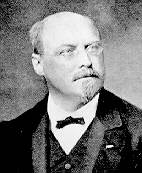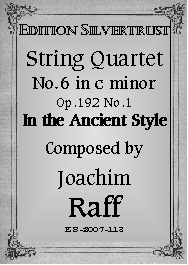Presents
Joachim Raff
 |
String Quartet No.6 in c minor, Op.192 No.1
"In the Ancient Style"
 Raff's
sixth string quartet, subtitled In the Ancient Style was part of one of the most
famous sets of string quartets published in the 19th century. Of this work,
Wilhelm Altmann, perhaps the most respected chamber music critic of all time,
has written:
Raff's
sixth string quartet, subtitled In the Ancient Style was part of one of the most
famous sets of string quartets published in the 19th century. Of this work,
Wilhelm Altmann, perhaps the most respected chamber music critic of all time,
has written:
"The Sixth Quartet is a "Suite in the Ancient Style", the sort or work of which Raff was a master. In five movements, the opening Praeludium begins with a powerful Larghetto at the end of which an extraordinary cadenza in the first violin leads to an Allegro. Here the main theme of the Larghetto is combined with that of a superb fugue. The second movement, a Minuetto, starts off as a classical minuet but quickly morphs into something far more romantic and enticing with the introduction of the lovely lyrical theme. There is no trio but a powerful middle section, which suddenly dissolves into a gorgeous and ethereal melody in the cello. A Gavotte and particularly atmospheric Musette follow. The fourth movement, Arie is a broadly phrased, expansive and stunning melody given forth by the first violin to a hushed accompaniment in the other voices. The finale is a fleet-footed Gigue."
Raff was widely regarded as one of Germany's leading composers. All of the critical commentaries which appeared up until World War I spoke of him as an equal to such masters as Mendelssohn, Schumann, Brahms, and Tchaikovsky. Incredibly, by the 1920's his music had all but disappeared from the concert stage. It seems virtually unimaginable that a composer whose talent was recognized and whose music was admired by Mendelssohn and Liszt, could become a mere footnote, yet this is what became of Raff and his music for most of the 20th century. Only now is he being rediscovered to the delight of those fortunate enough to hear his music.
Joachim Raff (1822-1882) was born near Zurich and his family had hoped he would be come a school teacher, but music was his first love. Basically self-taught, Raff sent some of his early compositions to Mendelssohn who immediately recognized his talent and arranged for their publication. Unfortunately, Mendelssohn died before he could help Raff much more. The young composer then approached Liszt who also took an interest in him and took him on as his personal secretary and copyist. During the six years he spent with Liszt, Raff became a member of the so-called "New German School" led by Wagner and Liszt. Although he broke from them in 1856, he was still regarded as a Wagnerite by the supporters of Brahms and the other classicists. In short, Raff was in neither camp, but attacked by both. Isolated, he went his own way, paying little attention to the musical politics of late 19th century Germany.
This work is a tour de force. It's inclusion on any concert program would surely be a great success. Additionaly, amateurs will certainly enjoy playing it. Out of print for more than a century, we are indeed pleased to bring it back.
Parts: $24.95